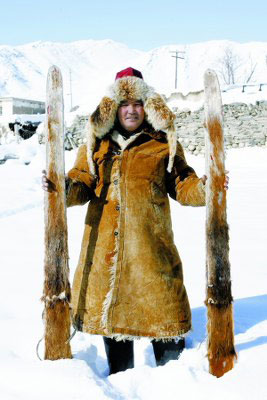By Zhou Jing
On the south bank of the Kanas Lake, live the Tuwa, a primitive Mongolian tribe with over 2,000 years' history who now exist only in the remote area of Hemu Village in northwest China's Xinjiang Uygur Autonomous Region.
Four years ago, major changes to the tribe's simple life were brought about by a tourism development plan for the area.
 |
|
Skis invented by the Tuwa's ancestors about 10,000 years ago have been shown to be the most ancient in the world. |
Crime has increased, their village has been hit by unusual sand storms, and the sacred lake of Kanas has seen the introduction of pollution by diesel oil leaking from boats.
Aleha (name in Pinyin), chief of the frontier defense police station of Hemu Village, said that in 2007, the first year of mass tourism, there were four serious criminal cases: one rape, one theft and two other serious offences. To date there have been a total of 47 criminal cases in the village, mainly because the local residents lack understanding of the need for self-protection.
A second change is a spate of unusual sand storms that have hit the area with assorted rubbish blown all over the place. "In the high season of a single year, more than 700,000 tourists swarmed into our small village; grasses on the roadsides were trampled and died," said a young local.
A further problem appeared in 2008 when the number of boats on Kanas Lake increased to over a hundred. Diesel oil from leaks could be seen floating on areas of the lake's surface, and dead fish were seen from time to time.
"Tourism did boost the tribe's development, but negative influences have also been felt and need to be addressed," said Mengk Bayir, a local celebrity and a member of the Chinese People's Political Consultative Conference (CPPCC), the top political advisory body in China.
Tuwa life
"This is a mysterious tribe," said Wang Hongqiao, deputy chief of the Kanas Scenic Area Managing Committee.
 |
|
The Tuwa inhabit the deep valleys of the Altay Mountains, which are covered with heavy snow for almost half of the year. |
The Tuwa inhabit the deep valleys of the Altay Mountains, which are covered with heavy snow for almost half of the year, so this primitive nomadic tribe has been isolated from the modern civilization of the 21st century. They believe in Shamanism and Lamaism and keep the primitive worship of fire and other natural forces as their ancestors did. They offer sacrifices to mountains, waters, heaven, fire and Aobao (a kind of stone cairn).
They live a nomadic life, residing in yurts or log houses roofed with straw. Due to the geographic conditions and natural environment, Tuwa habits and customs are similar to those of the Kazaks and Mongolians. They eat meat and dairy food, such as beef, mutton, milk, yogurt and milk-wine, in addition to potatoes and other vegetables.
They celebrate not only the Mongolian Aobao Festival but also the Spring Festival and Lantern Festival of Han Chinese. Every spring they leave their homes to drive their herds of cows and sheep to the grazing grounds till July or August, when they begin to make hay for feeding their livestock in the winter.
Hunting on skis used to be an important part of Tuwa life. Skis invented by their ancestors about 10,000 years ago have been shown to be the most ancient in the world. Though hunting is now prohibited, their craft of ski-making has been preserved.
The Tuwa population is around 2,500 and they have no written language. Their history has been passed down orally from generation to generation. Since there is no written archeological reference, their folk stories have inevitably added mysterious color to the tribe.
(China.org.cn March 23, 2009)